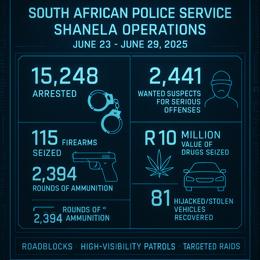Image created by AI
The Battle for Integrity: Analyzing the Controversial Reinstatement of Major-General Tiyo and the Fight to Reform SAPS
Ian Cameron's recent comments shine a harsh light on the systemic challenges within the South African Police Service (SAPS), particularly focusing on the controversial reinstatement of the previously dismissed Western Cape crime intelligence head, Major-General Mzwandile Tiyo. This decision has not only shocked the public but also reiterated the persistent struggle between those pushing for reform within SAPS and those entrenched in corruption.
Tiyo's initial dismissal earlier this year was a landmark action upheld by a comprehensive Section 34 inquiry which found him guilty of severe misconduct, including misuse of state resources, kidnapping, and assault. His removal was a statement against corruption—at least, it appeared so until his recent and puzzling reinstatement.
This turns a new page of concern, showing a flagrant disregard for SAPS’ own rules, specifically National Instruction 3/2017 which prohibits employees with pending cases from opting for early retirement as an escape from disciplinary actions. This loophole not only jeopardizes the integrity of SAPS but also demoralizes the ethical officers within the service, potentially shielding misconduct under bureaucratic red tape.
Moreover, Tiyo's case is just the tip of the iceberg. The broader narrative within SAPS Crime Intelligence speaks of an all-out resistance to reform. It appears the unit is fraught with division; for instance, another major general has evaded accountability since 2017 under the guise of long-term illness, while similar high-ranking officers are implicated in financial misconduct and undermining legal processes.
This festering issue highlights the battle between 'builders'—those striving to enforce accountability and ethical governance—and 'breakers'—those who manipulate their power and SAPS resources to obstruct reform efforts. The latter group's desperation to hold onto their unmerited privileges has manifested in numerous sabotage efforts against reform advocates within the service, including targeting division heads and other ethical officers.
The resistance from these entities often includes wielding influence through media and political connections, crafting narratives that stall or smear reform campaigns. This exploitation of whistleblower policies for personal gain signifies a twisted manipulation of systems meant to protect the integrity of law enforcement.
As the situation unfolds, the public and policymakers' outcry grows louder, demanding more stringent oversight and accountable leadership within SAPS. The Portfolio Committee on Police has been vocal, seeking justification for the disconcerting reinstatement of Tiyo and pushing for uniform disciplinary standards across SAPS.
This saga not only undermines previous efforts to clean up SAPS but also sends a critical message about the future direction of law enforcement in South Africa. Will SAPS align with the builders to foster a culture of transparency and reliability, or will it succumb to the breakers, perpetuating a cycle of corruption and mistrust? The resolution of this crisis will significantly impact public confidence in South Africa's police service and its capacity to uphold justice without bias.










